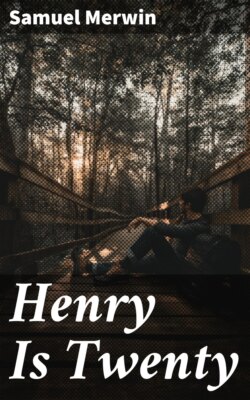Читать книгу Henry Is Twenty - Samuel Merwin - Страница 8
На сайте Литреса книга снята с продажи.
5
ОглавлениеTable of Contents
As they were turning into the Voice office, Henry caught sight of Mamie Wilcox, in a cheap pink dress and flapping pink-and-white hat, loitering by the hotel. He fell back behind Humphrey. Mamie beckoned with her head. He nodded, and entered the office; and she moved slowly on around the corner of the avenue.
He mumbled a rather unnecessary excuse to Humphrey, and slipped out, catching up with her on the avenue. She was unpleasantly attractive. She excited him.
'What is it?' he asked, walking with her. 'Did you want to speak to me?'
'Stuck up, aren't we!'
'Well?'
She pouted. 'Take a little walk with me. I do want to talk with you.'
'Haven't time. Got to get right back to the office.'
'Well—listen, meet me to-night. I can get out by eight. It's pretty important. Maybe serious.'
'Is it—-did anybody——'
She nodded. 'Mrs MacPherson. She was right in her door when I came out of your room.'
'Did she say anything?'
'She looked a lot.'
'Well, say—I'll see you for a few minutes to-night. Say about eight.' This was best. It would be dark, or near it. He simply mustn't be seen strolling with Mamie Wilcox along Filbert Avenue in broad daylight. 'What do you say to Douglass Street and the Lake Shore Drive?'
'All right. Tell you what—bring a tandem along and take me for a ride.'
'Oh, I can't.' But his will was weak. 'Got to report a concert. I don't know, though. I s'pose I could get around at half-past nine' or ten and hear the last numbers.'
He had often done this. Besides, he could probably manage it earlier. He knew he could rent a tandem at Murphy's cigar store down by the tracks. A quite wild, wholly fascinating stir of adventure was warming his breast and bringing that huskiness into his voice. He was letting go. He felt daring and a little mad. He hadn't realised, before to-day, that Mamie had such a lure about her.
Before returning to the office he got his bank-book and brazenly drew from the bank, savings department, his entire account, amounting to ten dollars forty-six cents. He also bespoke the tandem.
These were the great days of bicycling. The first highwheeled, rattling horseless carriage was not to appear in the streets of Sunbury for a year or two yet. Bicycle clubs flourished. Memorial Day each year (they called it Decoration Day) was a mad rush of excursion and road races. Every Sunday witnessed a haggard-eyed humpbacked horde of 'Scorchers' in knickerbockers or woollen tights. Many of the young men one met on train and street wore medals with a suspended chain of gold bars, one for each 'century run.'
And these were the first great days of the bloomer girl. She was legion. Sometimes her bloomers were bloomers, sometimes they were knickerbockers, sometimes little more than the tights of the racing breed. She was dusty, sweaty, loud. She was never the sort of girl you knew; but always appeared from the swarming, dingy back districts of the city. Sometimes she rode a single wheel, sometimes tandem with some male of the humpbacked breed and of the heavily muscled legs and the grotesquely curved handle bars. The bloomer girl was looked at askance by the well-bred folk of the shaded suburbs. Ministers thumped pulpits and harangued half-empty pews regarding this final moral, racial disaster while she rode dustily by the very doors.
Henry, as he pedalled the long machine through back streets to the rendezvous, was glad that the twilight was falling fast. In his breast pocket were copy paper and pencils, in an outer pocket his little olive-green book. His white trousers were caught about the ankles with steel dips.
Mamie kept him waiting. He hid both himself and the wheel in the shadows of the tall lilac bushes in the little village park.
She came at length, said 'Hello!' and with a little deft unhooking, coolly stepped out of her skirt, rolled up that garment, thrust it under a bush, and stood before him in the sort of wheeling costume rarely seen in Sunbury save on Saturdays and Sundays when the Chicago crowds were pouring through.
Henry stood motionless, silent, in the dusk.
'Well,' said she, smartly, 'are we riding?'
Without a word he wheeled out the bicycle and they rolled away.
She was very close, there before him. She bent over the handle bars like an old-timer, and pedalled with something more than the abandon of a boy. It was going to be hard to talk to her... If he could only blot this day out of his life. 'She started it,' he thought fiercely, staring out ahead over her rhythmically moving shoulder. 'I never asked her to come in!'
'I didn't know you rode a wheel,' said he, after a time, dismally.
'I ride Sundays with the boys from Pennyweather Point. But you needn't tell that at home.'
'I'm not telling anything at home,' muttered Henry. Then she flung back at him the one word.
'Surprised?'
'Well—why, sorta.'
'You thought I was satisfied to do the room work and wash dishes, I suppose!'
'I don't know as I thought anything.'
'What's the matter, anyway? Scared at my bloomers?'
'That's what you call'em, is it?'
'I must say you're grand company.'
He made no reply.
They pedalled past the university buildings, the athletic field, the lighthouse, up a grade between groves of oak, out along the brink of a clay bluff overlooking the steely dark lake—horizonless, still, a light or two twinkling far out.
'Shall we go to Hoffman's?' she asked.
'I don't care where we go,' said he.
